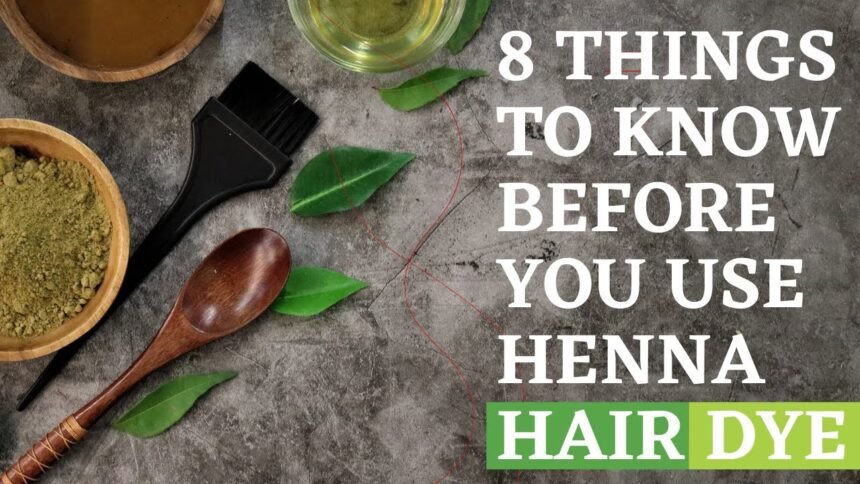Henna is much more than a traditional ingredient for mehndi designs. This ancient herb, derived from the henna plant (Lawsonia inermis), has been cherished for centuries for its natural coloring, conditioning properties, and versatility. While many people associate henna solely with temporary body art, it’s also an excellent solution for natural hair care and coloring. In this article, we explore 8 things you didn’t know about henna and why it should be part of your beauty and wellness routine.
1. Henna is a Natural Hair Dye
Many people are turning away from chemical hair dyes because of the damage they can cause. Color henna for hair dye provides a completely natural alternative. Unlike synthetic dyes that penetrate and damage hair shafts, henna coats the hair naturally, adding a protective layer that strengthens strands and adds shine.
Using pure, certified organic henna ensures that your hair remains healthy, vibrant, and free from harsh chemicals. This makes it ideal for people looking to color their hair naturally while maintaining hair strength.
2. Different Types of Henna Colors for Hair
One of the most exciting things about henna is the variety of colors you can have with henna for hair. Depending on how you mix it and your hair type, henna can give you a range of shades:
- Rich red-orange tones: The classic henna shade, perfect for traditional looks.
- Deep auburn hues: Achieved by blending henna with coffee or black tea.
- Brownish tints: Mixing henna with indigo or other natural herbs can create darker shades.
- Custom shades: Using ingredients like beetroot juice or hibiscus powder can result in unique red or burgundy tones.
This versatility makes henna hair coloring an excellent choice for those who want natural, vibrant, and customizable hair colors.
3. Henna is Completely Natural
The henna plant is 100% natural, and when processed correctly, it results in certified organic pure henna powder. This type of henna is free from harmful chemicals, additives, or synthetic dyes, making it safe for all hair types and skin applications.
By sourcing your henna from trusted manufacturers like Kirpal Export, you can be sure that you’re getting high-quality, natural henna that’s suitable for hair, mehndi, or bulk business use.
4. Henna Strengthens Hair
Beyond coloring, henna is a natural hair conditioner. Regular use can improve hair texture, reduce split ends, and make hair shinier and thicker. Unlike chemical dyes, henna works on the hair’s surface, coating each strand and protecting it from environmental damage.
This makes henna particularly beneficial for people with dry, brittle, or chemically-treated hair, as it restores health while adding color.
5. Mix It to Customize Your Hair Color
One of the best things about henna is its flexibility for customization. You can color your hair naturally – just mix this in henna & apply it with other natural ingredients:
- Coffee or black tea: Darkens the shade, creating rich brown hues.
- Indigo powder: For deeper, darker colors.
- Beetroot or hibiscus juice: Adds reddish undertones.
This DIY approach allows you to achieve unique, natural hair colors while keeping your hair healthy.
6. Henna Protects Scalp Health
Henna isn’t just a colorant—it’s also a natural scalp healer. The herb has antibacterial and antifungal properties, helping to reduce dandruff and soothe irritation. Applying color henna for hair can balance scalp oils, improve circulation, and leave your hair and scalp feeling refreshed and nourished.
7. Safe for All Hair Types
Whether your hair is straight, curly, thick, or fine, henna works well as a natural coloring agent. It’s chemical-free, making it safe for frequent use without the risk of hair damage. Salons and individuals worldwide trust organic henna for professional and home hair coloring alike.
8. Henna Isn’t Just for Hair
While many people know henna as a hair color, it’s also widely used for mehndi and temporary body art. Traditional henna mehndi (all-natural body art organic herbal temporary) designs are safe for skin, chemical-free, and deeply rooted in cultural rituals, festivals, and celebrations.
Henna is also applied on eyebrows, hands, and feet, making it an incredibly versatile plant for natural cosmetics and personal care.
Additional Tips for Using Henna for Hair
- Prep Your Hair Properly: Wash hair with a mild shampoo and avoid conditioner before applying henna.
- Mix and Wait: Let henna paste sit for a few hours to release natural dye.
- Apply Thoroughly: Use gloves to apply evenly from roots to tips.
- Leave It On: For best results, leave henna on your hair for 2–4 hours before rinsing.
Aftercare: Use mild, sulfate-free shampoos to maintain hair color and health.









